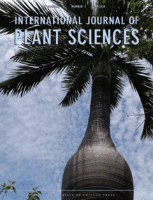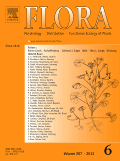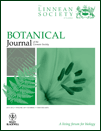
PRESLIA
Scope & Guideline
Connecting Researchers, Cultivating Ideas
Introduction
Aims and Scopes
- Plant Diversity and Ecology:
The journal emphasizes the study of plant diversity and ecological interactions, examining how various species coexist and compete in different habitats. - Invasive Species and Alien Flora:
There is a significant focus on the impacts of invasive species and the dynamics of alien flora in Europe, highlighting their distributions and ecological consequences. - Conservation Biology:
Research addressing conservation status, ecology, and management of threatened species and habitats is a core area, reflecting a commitment to biodiversity preservation. - Biogeography and Phylogeography:
The journal explores biogeographical patterns and phylogeographical structures among plant species, providing insights into their historical distributions and evolutionary processes. - Methodological Innovations:
PRESLIA showcases innovative methodologies in plant research, including molecular tools, ecological modeling, and database developments, enhancing the scientific understanding of plant communities.
Trending and Emerging
- Climate Change Impacts:
There is an increasing focus on the effects of climate change on plant distributions and ecosystem dynamics, emphasizing the need to understand how species adapt or shift in response to changing environmental conditions. - Functional Traits and Ecosystem Services:
Research on functional traits of plants and their implications for ecosystem services is gaining traction, highlighting the importance of understanding the roles of different species in ecosystem functioning. - Anthropogenic Influences on Vegetation:
Studies examining the interactions between human activities and vegetation dynamics are emerging, reflecting a growing interest in understanding how urbanization, agriculture, and other anthropogenic factors affect plant communities. - Molecular Ecology and Genomics:
The application of genomic tools and molecular techniques in understanding plant diversity and evolutionary processes is increasingly prevalent, indicating a trend towards integrating molecular data with ecological studies. - Restoration Ecology:
Research focused on the restoration of degraded ecosystems and the role of native versus invasive species in these processes is becoming more common, aligning with global conservation priorities.
Declining or Waning
- Traditional Taxonomy:
There seems to be a diminishing emphasis on traditional taxonomic studies, as modern approaches integrating molecular techniques gain traction over classical morphological classifications. - General Flora Surveys:
While specific flora surveys remain important, broader, generalized surveys of flora across larger regions appear to be less frequent, likely due to a shift towards more detailed ecological and functional studies. - Historical Ecology:
Research focusing solely on historical ecological changes without linking to contemporary conservation efforts is less prominent, suggesting a trend towards applied ecological research.
Similar Journals

Botany
Innovating methodologies for a greener future.Botany is a premier academic journal published by Canadian Science Publishing, dedicated to advancing the understanding of plant sciences and ecological systems. With an ISSN of 1916-2790 and an E-ISSN of 1916-2804, this journal has established itself as a respected publication in the fields of Ecology, Evolution, Behavior and Systematics, and Plant Science, reflected in its 2023 Q2 and Q3 rankings. Covering a wide range of topics, Botany is committed to fostering interdisciplinary research, promoting innovative methodologies, and disseminating significant findings from both theoretical and applied perspectives. Based in Ottawa, Canada, the journal is open access, ensuring that high-quality research is accessible to a global audience, thereby playing a crucial role in the dissemination of knowledge in the scientific community. With convergence years from 2008 to 2024, it continues to evolve alongside the scientific advancements in botanical studies, making it an essential resource for researchers, professionals, and students alike.

INTERNATIONAL JOURNAL OF PLANT SCIENCES
Connecting researchers with groundbreaking plant studies.The INTERNATIONAL JOURNAL OF PLANT SCIENCES, published by UNIV CHICAGO PRESS, is a leading journal dedicated to advancing knowledge in the fields of plant sciences and ecology. With an ISSN of 1058-5893 and an E-ISSN of 1537-5315, this journal has been a prominent platform for groundbreaking research since its establishment, featuring works from 1983 to present. It holds an impressive Q2 ranking in both Ecology, Evolution, Behavior and Systematics and Plant Science, reflecting its reputable standing within the academic community. The journal is well-regarded for its rigorous peer-review process and commitment to high-quality publication standards, making it a favored choice for researchers, students, and professionals eager to engage with the latest findings and innovative methodologies in plant research. While it does not currently operate under an Open Access model, the journal provides ample access options for institutions and individuals keen to explore its curated content. By presenting diverse studies that blend theoretical and practical insights, the INTERNATIONAL JOURNAL OF PLANT SCIENCES plays a critical role in fostering interdisciplinary dialogue and advancing the frontiers of plant science research.

FLORA
Innovating Research in Ecology and Plant StudiesFLORA is a distinguished journal published by Elsevier GmbH, focusing on the realms of Ecology, Plant Science, and Evolutionary Biology. Established in 1975, this journal has been a vital platform for researchers and professionals, disseminating groundbreaking findings and insights relevant to the plant sciences. With an impressive impact factor and a current Scopus ranking placing it in the second quartile (Q2) across multiple categories, FLORA is recognized as a critical resource for advancing knowledge in its respective fields. The journal publishes both traditional research articles and significant review papers, ensuring a broad spectrum of academic engagement. Although not open access, FLORA remains committed to enhancing the scientific discourse and fostering collaboration among scholars worldwide. Researchers seeking to enrich their understanding of ecological dynamics and plant biology will find FLORA to be an essential addition to their academic repertoire.

FOLIA GEOBOTANICA
Uncovering the past to illuminate the future of plant ecology.FOLIA GEOBOTANICA, published by Springer, is a distinguished journal dedicated to advancing the fields of Paleontology and Plant Science through the dissemination of high-quality research. With an ISSN of 1211-9520 and an E-ISSN of 1874-9348, this journal has been pivotal in providing a platform for innovative studies from 1994 to 2024. Notably, FOLIA GEOBOTANICA holds a Q3 ranking in Paleontology and a Q2 ranking in Plant Science as of 2023, affirming its relevance and contribution to the scholarly community. The journal is located in the Netherlands at VAN GODEWIJCKSTRAAT 30, 3311 GZ DORDRECHT, and is not an Open Access publication, ensuring comprehensive review processes and scholarly integrity. With Scopus rankings that place it in the 50th percentile for Plant Science and 46th for Paleontology, FOLIA GEOBOTANICA continues to attract researchers, professionals, and students who are keen to explore the intricacies of plant ecology and fossil records, thereby fostering a deeper understanding of ecological and evolutionary patterns.

BOTANICAL JOURNAL OF THE LINNEAN SOCIETY
Fostering Innovation in Botanical Research and TheoryThe Botanical Journal of the Linnean Society, published by Oxford University Press, stands as a premier platform for interdisciplinary research within the realms of Ecology, Evolution, Behavior, and Plant Science. With a notable impact factor reflective of its esteemed reputation, this journal is classified in the Q1 quartile for both Ecology and Plant Science, placing it among the most influential publications in these fields. Since its inception in 1969, and with an anticipated convergence of research extending to 2024, it has become essential for scholars and professionals seeking to engage with cutting-edge studies, theoretical frameworks, and practical applications that drive our understanding of plant biology and ecological systems. The journal’s commitment to excellence is underscored by its robust Scopus rankings—achieving an impressive 83rd percentile in Ecology and a 82nd percentile in Plant Science. This makes the Botanical Journal of the Linnean Society a crucial resource for researchers, educators, and students alike, eager to advance their knowledge and contribute to the evolving discourse in botany and environmental studies.

Hacquetia
Empowering Ecological Research with Open AccessHacquetia is an esteemed open-access journal dedicated to the interdisciplinary exploration of ecology, evolution, behavior, systematics, forestry, and plant science. Published by SCIENTO since 2007, this journal has established itself as a pivotal platform for researchers and academics looking to disseminate their findings in these critical fields. Nestled in the heart of Warsaw, Poland, Hacquetia offers unrestricted access to its content, promoting knowledge sharing among professionals, students, and enthusiasts alike. The journal, while ranked in the Q4 category across its relevant disciplines in 2023, serves as a valuable resource for those seeking to contribute to and engage with contemporary ecological and botanical research. Its commitment to open access ensures that cutting-edge research is available to a global audience, fostering innovation and collaboration in the scientific community.

ACTA SOCIETATIS BOTANICORUM POLONIAE
Advancing Plant Science Through Open Access ResearchACTA SOCIETATIS BOTANICORUM POLONIAE is a reputable open-access journal dedicated to the field of Plant Science, published by the Polskie Towarzystwo Botaniczne since 1923. With an ISSN of 0001-6977 and an E-ISSN of 2083-9480, this journal has made significant contributions to the botanical sciences, fostering the dissemination of research from Poland and beyond. The journal has ranked in the third quartile (Q3) within its category in the 2023 journal metrics, demonstrating a strong presence in the global academic community, as evidenced by its Scopus ranking of 291/516 within the Agricultural and Biological Sciences sector, placing it in the 43rd percentile. While specific H-Index data are currently not available, ACTA continues to attract submissions from a broad international audience and publishes a wide range of studies that advance the understanding of plant biology, ecology, and conservation. The journal remains a vital resource for researchers, professionals, and students alike, committed to enhancing knowledge and collaboration in botanical science.

PLANT SPECIES BIOLOGY
Elevating Knowledge in Plant Species and Their EnvironmentsPLANT SPECIES BIOLOGY, published by WILEY in the United Kingdom, is a prominent journal dedicated to advancing the understanding of plant species, their biology, ecology, and roles within ecosystems. With an impressive convergence of research dating back to 1986 and extending through 2024, this journal caters specifically to specialists in the fields of plant science and ecology. The journal's current impact factor further underscores its significance, ranking in the Q2 quartile across three relevant categories: Ecology, Ecology, Evolution, Behavior and Systematics, and Plant Science. As a member of the Scopus ranks, it holds respectable positions within its categories, evidencing its contribution to impactful scientific discussions and knowledge. Although it is not an open-access journal, PLANT SPECIES BIOLOGY provides essential insights, fostering interdisciplinary dialogue and discovery for researchers, professionals, and students dedicated to exploring the complexities of plant species and their ecosystems.

TUEXENIA
Advancing ecological knowledge for a sustainable future.TUEXENIA is a prominent academic journal dedicated to advancing the fields of Ecology, Management, Monitoring, Policy and Law, Nature and Landscape Conservation, and Plant Science. Published by the Floristisch-Sozioogischen Arbeitsgemeinschaft e.V. in Germany, this journal has established itself as a pivotal resource for researchers, professionals, and students alike since its inception in 1985, with a continued commitment to scholarly excellence through 2024. Distinguished by its consistent Q3 quartile rankings across several related categories in 2023, TUEXENIA serves as a vital platform for the dissemination of innovative research and practical applications that address the pressing challenges in environmental science. While it currently does not support an open-access model, the journal's compelling content is crucial for those seeking to deepen their understanding and contribute to impactful discussions in ecology and conservation. With an increasing audience on platforms like Scopus, TUEXENIA is instrumental in bridging the gap between research and real-world environmental management, making it an essential read for anyone engaged in these dynamic fields.

BRITTONIA
Unveiling Nature's Secrets: A Journey Through Plant SciencesBRITTONIA, published by Springer, stands as a reputable journal dedicated to advancing the fields of botany and plant sciences. With a storied history dating back to 1931, this journal has evolved to embrace contemporary research spanning various aspects of plant biology, ecology, and systematics. Focusing on a comprehensive analysis of both ecological interactions and plant systematics, BRITTONIA plays a crucial role in disseminating knowledge among researchers and professionals committed to understanding plant life and its environmental contexts. Despite its open access status being currently unavailable, the journal ensures wide accessibility through institutional subscriptions. In the latest rankings, it proudly holds a Q2 category in Plant Science and a Q3 category in Ecology, Evolution, Behavior, and Systematics, indicating its growing influence and academic rigor. Researchers and students alike will find BRITTONIA an essential resource for the latest findings and discussions in plant sciences.